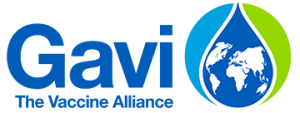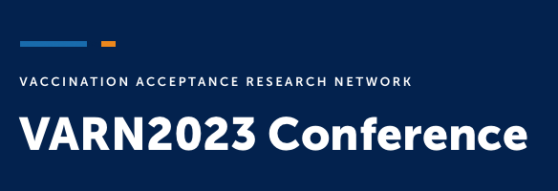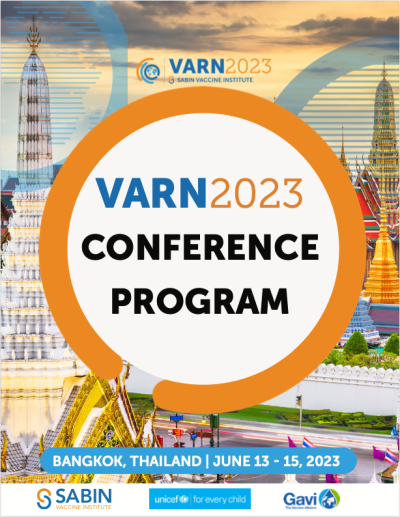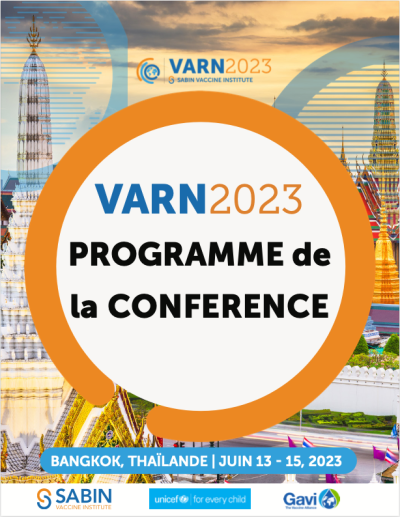
The 2nd Annual VARN Conference has now completed.
Thank you for participating!
See the recordings page to access video on demand.
Recordings are available in English with French subtitles.
The 2nd Annual VARN Conference has now completed.
Thank you for participating!
See the recordings page to access video on demand.
Recordings are available in English with French subtitles.

June 13-15 | Bangkok Thailand
The Sabin Vaccine Institute’s Vaccination Acceptance Research Network (VARN) and UNICEF, in partnership with Gavi, the Vaccine Alliance welcome you to VARN2023.This meeting is an opportunity to engage with the latest in research and practice from around the world and inform agenda setting around three core themes:
- Vaccine equity: setting a new course for reaching marginalized and zero-dose communities, conflict-settings, and reducing gender barriers
- Reimagining essential childhood immunization: a reversal of current trends and improved integration into comprehensive health service delivery programs (from policy to community-level responses)
- Life-course immunization: extending the opportunities of COVID-19 vaccination investments to integrate, expand and strengthen LCI (HPV vaccination, future pandemic preparedness, and healthy aging).
We will be providing simultaneous live audio interpretation in French and English for all sessions. All posters in English and French will have translated abstracts available.
In 2022, Sabin’s inaugural VARN conference and the COVID-19 global demand event, co-hosted by UNICEF and partners, brought together over 1500 global experts as registered attendees across 126 countries. Participants represented diverse disciplines including global health and policy, research and academia, and healthcare and health communications. Explore the VARN2022 conference report and recordings for insights from last year’s convening.

CONFERENCE PROGRAM

ABOUT US

The Sabin Vaccine Institute is a leading advocate for expanding vaccine access and uptake globally, advancing vaccine research and development, and amplifying vaccine knowledge and innovation. Unlocking the potential of vaccines through partnership, Sabin has built a robust ecosystem of funders, innovators, implementers, practitioners, policy makers and public stakeholders to advance its vision of a future free from preventable diseases. As a non-profit with more than two decades of experience, Sabin is committed to finding solutions that last and extending the full benefits of vaccines to all people, regardless of who they are or where they live. At Sabin, we believe in the power of vaccines to change the world.

UNICEF believes that taking people centered approaches in the design of the delivery and utilization of health programmes is fundamental to ensure that immunization and other health services are tailored to the needs of the most vulnerable, particularly in zero dose and under-vaccinated communities. To achieve this, UNICEF supports countries to develop evidence-based, locally-informed, context-specific strategies with active community participation to improve vaccine uptake.

Gavi, the Vaccine Alliance is a public-private partnership that helps vaccinate half the world’s children against some of the world’s deadliest diseases. Since its inception in 2000, Gavi has helped to immunise a whole generation – over 981 million children – and prevented more than 16.2 million future deaths, helping to halve child mortality in 73 lower-income countries. Gavi also plays a key role in improving global health security by supporting health systems as well as funding global stockpiles for Ebola, cholera, meningococcal and yellow fever vaccines. After two decades of progress, Gavi is now focused on protecting the next generation, above all the zero-dose children who have not received even a single vaccine shot. The Vaccine Alliance employs innovative finance and the latest technology – from drones to biometrics – to save millions more lives, prevent outbreaks before they can spread and help countries on the road to self-sufficiency. Learn more at www.gavi.org and connect with Gavi on Facebook and Twitter.

ORGANIZERS
Surangani Abeyesekera
Surani Abeyesekera is a communication practitioner with over 23 years’ experience in Social and Behaviour Change Communication with the UN and a further 5 years’ experience in the field of advertising with two of the largest advertising agencies in the world. She has worked in UNICEF offices in Sri Lanka, the Pacific based in Fiji, Bangladesh, Nigeria, Ghana, Somalia, Kenya and also briefly in Indonesia with FAO in 2008. She is now based in New York with UNICEF Head Quarters. Prior to joining UNICEF, Surani had over 5 years of experience working in two global communications agencies. McCann Erickson and J. Walter Thompson, (JWT). Surani is passionate about her work around behaviour and social change and has years of experience in working in emergency as well as development contexts over the past 23 years. She now supports the Immunisation Demand team at UNICEF HQ, as a Social and Behaviour Change Specialist. She supports the work on global vaccine demand and addressing vaccine hesitancy. She leads the related to social listening and infodemic management for UNICEF. Surani also now chairs the Digital Information Environment workstream of the Vaccination Demand Hub. Surani also leads the work around capacity building to increase demand for immunisation while also supporting other routine immunisation related interventions for UNICEF. Surani holds a bachelor’s degree in Marketing and Communication, and a master’s in digital communications. Surani has co-authored several papers related to vaccine demand and related fields over the last several years.
Kate Hopkins, PhD, MPH
Director of Research, Vaccine Acceptance & Demand. Dr. Kate Hopkins oversees research programming across the Vaccine Acceptance & Demand team to implement program activities, expand and manage partnerships, invest in new research projects and continue the growth of Sabin’s thought leadership programming. Prior to joining Sabin, Kate spent 11 years living and working in sub-Saharan Africa conducting infectious disease prevention and psychosocial-behavioral research and health service program implementation in low- and middle-income countries—with particular focus on high-risk and vulnerable populations. Managing multi-country and multidisciplinary teams, her past portfolio of work included supporting clinical research site operations and strengthening capacity for the conduct of HIV and COVID-19 vaccine clinical trials within the HIV Vaccine Trials Network and COVID-19 Prevention Network. Kate supported the implementation of the ENSEMBLE J&J Phase III clinical trial and the subsequent SISONKE J&J COVID-19 vaccination rollout amongst healthcare workers in South Africa. Kate has been a joint-Faculty Researcher for the Faculty of Health Sciences, University of the Witwatersrand in Johannesburg, South Africa, for nine years; and is a virtual course lecturer on Operational Research within a post-graduate diploma program in TB/HIV Management for the University of Cape Town in South Africa. She was awarded funding for her PhD study from the CDC as a PEPFAR-funded activity under its Cooperative Agreement with the South African Medical Research Council, earning her degree from the University of the Witwatersrand School of Public Health. She also holds a Masters in Public Health, with a focus on Global Health, from Boston University School of Public Health.
Charles Kakaire, MPH
Charles Kakaire is the Social and Behaviour Change Specialist in the Immunisation Demand section at UNICEF Headquarters in New York where he supports the roll out of human centred approaches, HPV vaccine communication and Interpersonal communication for immunisation. He also oversees the UNICEF Immunisation Demand engagement with Faith based Partners. Prior to this role, Charles worked with the UNICEF regional office for Eastern and Southern Africa overseeing the Risk communication and community engagement components of humanitarian and public health emergencies as well as the Johns Hopkins Center for Communication Programs on various regional projects. Charles holds a Master of Public Health/Social and Behaviour Change Communication from University of Witwatersrand. He recently co-authored a Chapter in the Book – Communication and Community Engagement in Disease Outbreaks; Dealing with Rights, Culture, Complexity and Context
Stacey Knobler, MPH, MSc
Vice President, Vaccine Innovation & Global Immunization. Stacey Knobler has more than 20 years’ experience researching and developing programs and recommendations related to public health, the management of health systems, vaccines and vaccination. As VP, Vaccine Innovation & Global Immunization at Sabin, Stacey leads Sabin’s strategic planning efforts across organizational programming; convenes global experts to recommend strategies for accelerating and transforming vaccine development and delivery; assesses changing policies and practices across the vaccine development, regulatory and response landscape; and reviews how emerging technologies can benefit future vaccine development and delivery. With the Fogarty International Center at the U.S. National Institutes of Health, Stacey supported strategic planning and program direction for the Division on International Epidemiology and Population Studies, inclusive of the Malnutrition and Enteric Disease Study (MAL-ED), the Multinational Influenza Seasonal Mortality Study (MISMS), and training and capacity-strengthening initiatives focused on bioinformatics and phylogenetics, epidemiological modeling and data analytics, and biosafety and biosecurity systems in Sub-Saharan Africa, South Asia, Latin America, and the Middle East. At the National Academy of Sciences Institute of Medicine (NAM), she was the founding director of the Forum on Emerging Infections, led multiple projects to establish global public health priorities—including the scale-up of antiretroviral treatments and neurological and psychiatric disorders—and she developed a partnership effort between the National Academies and 8 African Academies of Science (ASADI). Stacey has published over 45 peer-reviewed articles and edited volumes. She earned a Masters of Science degree in Public Health from the London School of Hygiene & Tropical Medicine in the UK. Stacey serves on the steering committee of the Influenza Vaccine Roadmap Initiative and is a member of the Global Funders Consortium for Universal Influenza Vaccine Development.
Gloria Lihemo
Gloria Lihemo is an immunization Social and Behaviour Change Specialist at UNICEF headquarters. She coordinates UNICEF’s work on COVID-19 vaccine acceptance and uptake, supporting country and regional initiatives on generating and implementing evidence-based strategies to engage communities to increase COVID-19 vaccination coverage. While at the same time, collaborating with global stakeholders as part of the global Vaccine Acceptance Task Team to develop technical guidance and tools that support countries in their work in promoting demand for vaccination. She has over 15 years’ experience designing and implementing social and behaviour change strategies to improve water, sanitation, hygiene (WASH), health, and nutrition outcomes. Her work spans assignments with international organization including UNICEF, the World Bank, Canada’s International Development Research Centre and INGOs in sub-Saharan Africa (Kenya, Somalia, Chad, and D.R Congo) and Central and South Asia (Pakistan, Tajikistan, and Nepal). A cross-cutting theme throughout her work has been ensuring the integration of gender responsive programming as well youth engagement and participation.
Deepa Risal Pokharel, MA
Deepa Risal Pokharel is the Senior Adviser-Social Behaviour Change and team lead for Immunization Demand in UNICEF headquarters in New York. She has over 25 years of diverse experience in designing, leading, managing and implementing social and behaviour change communication (SBCC) strategies and interventions at national, regional and global level. Deepa has represented UNICEF in various global and regional forums to promote vaccine demand and community engagement. Before joining New York Headquarters, Deepa worked in UNICEF Pakistan, UNICEF Regional Office in Nairobi, UNICEF Zambia and UNICEF Nepal in different capacities working in immunization, health and broader social and behaviour change on child survival, development and protection. She is a believer in people’s positive strength and power of team to make things work.
Theresa Sommers, PhD, MPH
Theresa is the Senior Manager of Research for the Vaccine Acceptance and Demand Initiative at the Sabin Vaccine Institute. Her background spans infectious disease programming and policy, including pandemic preparedness and response, within multilateral (WHO) and bilateral (US CDC) health organizations and on-the-ground qualitative health research in Sub Saharan Africa and the Southern US. She has also worked within academic institutions and the nonprofit sector to support infectious disease capacity building and research in LMICs. She has been adjunct faculty of multiple universities for over six years, teaching both undergraduate and graduate-level courses and is currently an affiliated Researcher for the Migration and Health Project Southern Africa within the African Centre for Migration and Society at Wits University (South Africa), as well as a Course Director in Research Ethics at the Department of Infectious Disease and Global Health at Tufts University, Cummings School of Veterinary Medicine. Theresa holds a PhD in Global Governance and Human Security (Global Health track) from the University of Massachusetts Boston, an MPH from Boston University, and a BA from Wellesley College.

VARN ADVISORY COMMITTEE
Eve Dubé, PhD
Eve Dubé is a medical anthropologist. She is affiliated with Quebec National Institute of Public Health in Quebec, Canada. She is a research scientist at the Research Center of the CHU-Québec and an invited professor in the Department of Anthropology at Laval University. Her research program focuses on the sociocultural determinants of vaccination. She is the lead investigator of the Social Sciences and Humanities Network of the Canadian Immunization Research Network. She is interested in how to enhance vaccine acceptance and uptake and she is leading different projects around this issue. She sits on a number of committees as an expert on vaccine acceptance and hesitancy. She was a member of the World Health Organization working group on vaccine hesitancy.
Abdul Momin Kazi, MBBS, MPH
Momin Kazi is an Assistant Professor research, at the Aga Khan University Hospital. He is a physician (M.B.B.S in Dow Medical College, Pakistan), an epidemiologist (MSc. Vanderbilt University, TN USA) and is pursuing his PhD from the University of British Columbia, BC, Canada. Momin Kazi work focuses around digital/mobile health (mhealth) based interventions applying mixed methods and using technology as a tool in research studies to improve vaccination coverage and decrease vaccine hesitancy. Currently Momin Kazi is involved as an investigator with multiple research studies, and funded through NIH, BMGF, GAVI and GCC, to name few. He is also codirector of “Research Methods & Applications for Digital Health” course, offered to graduate students at AKU. His work interest also includes development and evaluation of esystems for real time visualization of data, geospatial analysis and development of auto generated systems including (SMS and automated calls), digital applications and AI and ML models for improving maternal and child health including vaccination coverage and hesitancy. He has published over 60 papers with h-index of 19 and heavily advocating on vaccine preventable diseases, and maternal child health in lower-middle income countries.
Rupali Limaye, PhD, MPH, MA
Rupali J. Limaye, PhD, MPH, MA, serves as a full-time faculty member at the Johns Hopkins Bloomberg School of Public Health, in the Departments of International Health, Epidemiology, and Health, Behavior and Society. Widely seen as an expert in vaccine behavior and decision-making, including vaccine hesitancy and acceptance, she serves as the Deputy Director at the International Vaccine Access Center. Primarily focusing on infectious diseases, Dr. Limaye is a social and behavioral scientist and health communication scholar. Her mixed-method work examines how various influences affect health behavior and how to leverage those influences to affect positive behavior change. She also studies how health information can best be communicated to individuals in different contexts and through different channels. In her 15 years of working in global health, she has worked in more than 30 countries from both research and implementation perspectives, on topics including immunization, family planning, HIV/AIDS, maternal and child health, and alcohol, and teaches classes on health behavior change and persuasive communication. She received her PhD from the Johns Hopkins Bloomberg School of Public Health. She also holds an MPH in global health, an MA in international affairs, a BA in political science, and a BS in journalism.
Rubina Qasim, MSc
Rubina Qasim, RN/RM, BScN, MScN, is working as Assistant Professor at the Institute of Nursing & Midwifery, Dow University of Health Sciences Karachi, Pakistan. Rubina has more than 10 years of teaching and research experience in both public and private sector academic institutions in Pakistan. Her area of research is maternal and child health including routine immunization, hesitancy, and vaccine acceptance among marginalized hard-to-reach population. Rubina is the recipient of Sabin 2020 Social and Behavioral Research Grant. She is leading a team of research staff including volunteer undergraduate nursing students, working for the health and social uplifting of the marginalized population living in the slum peri-urban Karachi, Pakistan.
Holly Seale, PhD, MPH
Associate Professor Holly Seale is a Social Scientist at the School of Population Health, University of New South Wales in Sydney Australia and the Deputy Chair for the Collaboration on Social Science and Immunisation. Over 17 years, Holly has led a research program focused on the sociological aspects of infectious diseases and infection prevention. Specifically, her research encompasses the individual, and organisational factors that influence acceptance with infection prevention strategies and community engagement. Her research spans pharmaceutical and non-pharmaceutical prevention strategies, includes qualitative and quantitative research approaches and consumers such as hospital healthcare workers, special at-risk groups (people with underlying illness, migrants/refugees), students and the general public. She works closely with local and state health departments to lobby for improved opportunities for vaccination, as well as to improve communication packages.


